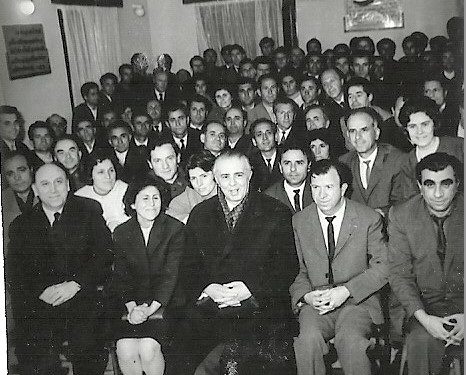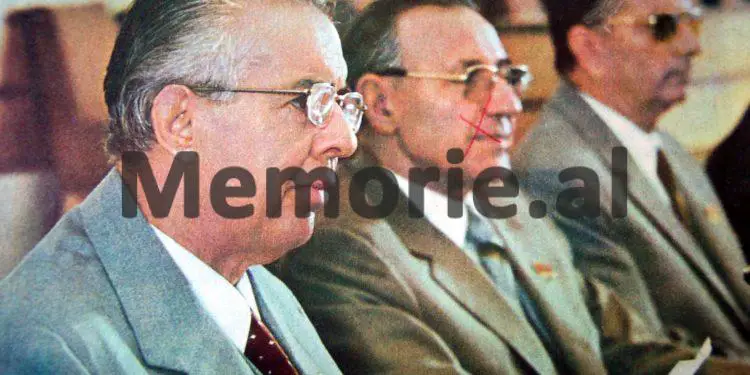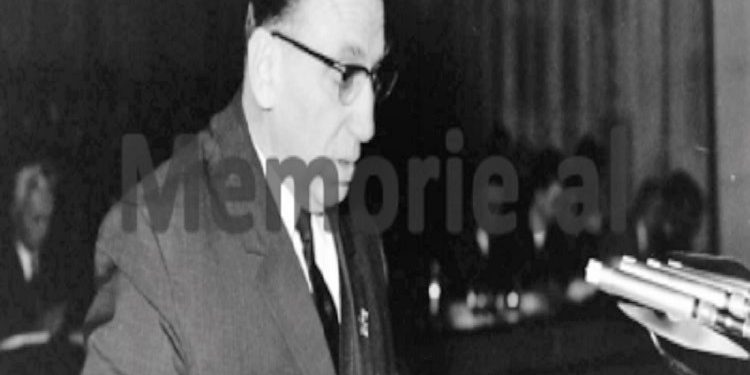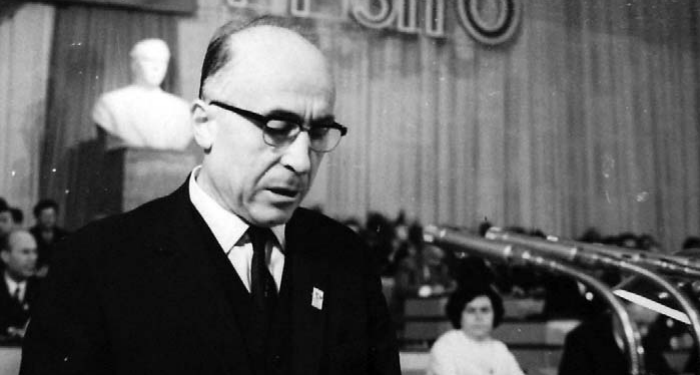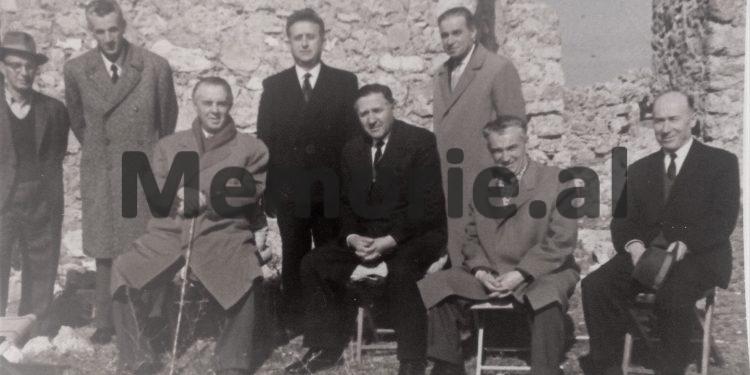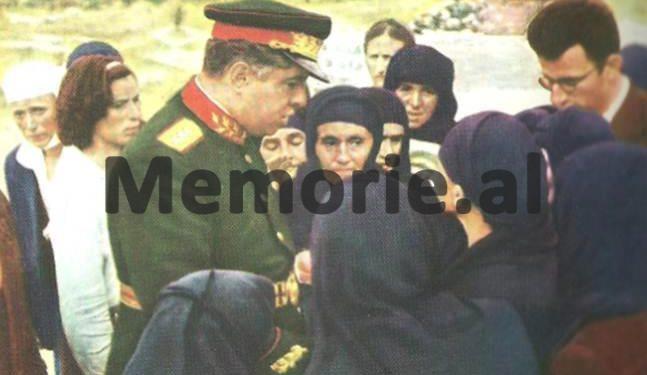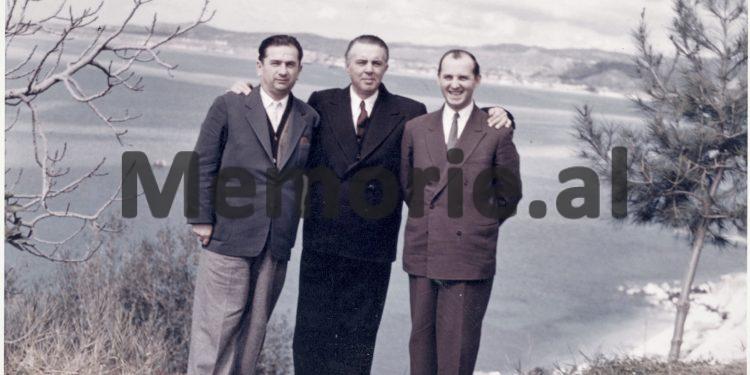Memorie.al / While he was on his usual vacations in his villa in the residential area in the place called Uji i Ftohte on the outskirts of the city of Vlora, (where for years he went regularly with his wife Nexhmijen, from March to the beginning of June ), accompanied by Hysni Kapo (secretary of the Central Committee of the ALP), as well as the first secretary of the Party Committee of the district, Gaqo Nesho, Enver Hoxha held a meeting with cadres of the party and the local government of that district , as well as mass organizations, such as; The Democratic Front, the Professional Unions, the Women’s organization, the Veterans of the Anti-Fascist National Liberation War, etc. From the beginning of his speech, after “a warm atmosphere” was created for those present at that meeting and he informed them how he was spending his vacation in Vlora, starting from walks, visits, various meetings with the people simple, etc., Enver Hoxha held a long conversation about the problems of the oil industry, asking one of the specialists in that field, who was present there and giving them instructions, at the end of the meeting, Enver also made an exposition of brief about the “hostile groups” that had been discovered in the Army and Economy, headed by Beqir Balluku, Abdyl Këllez, Koço Theodhos, etc., accusing them of being “enemies of the people and the Party, who received directives from Tito and the Yugoslavs”. etc., All this is made known by an archival document with the minutes of this meeting located in the Central State Archive (the fund of the former PPSh Central Committee), which Memorie.al publishes below.
-From conversations with cadres of the Party, the government and mass organizations of the Vlora district-
April 2, 1976
While he was on vacation in the city of Vlora, Comrade Enver Hoxha held a meeting with district cadres. From the beginning, he created a warm social atmosphere for those present and then, as if without realizing it, he moved on to the issues that he was going to address and that were currently preoccupying the Party and the country.
COMRADE ENVER HOXHA: Today I am very happy, friends, to meet you. I know most of you, especially those who are older, but I am also looking at young friends here. This is a great pleasure for us, because it means that the organization of the Party, like everywhere, even in the district of Vlora, has brought new elements to the leadership, who try to unite their forces, energies and skills with us, the older ones. Of course, you have worked and reaped success in the important tasks assigned to you, and I believe that the first secretary of the District Party Committee will tell us about some of them.
COMRADE GAQO NESHO: You, Comrade Enver, expressed the great pleasure you feel meeting with us, but we also feel an even greater pleasure meeting you today. All the people of Vlonia, from the city and the countryside, were happy when they found out that you have come in this beautiful season to spend a few days in our city.
COMRADE ENVER HOXHA: It’s really good to rest here and all the days of our stay have been very beautiful. I had the chance to rest another time this season in Vlora, but sometimes the weather was not good, with strong wind. This year the days of stay were so beautiful, that they encourage me not only to make good propaganda about Vlora to my friends, but also to tell them to come and spend their annual leave time here again and again. Comrade Hysni also came to rest here for a few days, yes, but we hardly filled his mind, it was hard to get him to rest.
The truth is that now that we are older, we feel the need for rest more. I believe that you also follow the directives of the Central Committee to rest, as prescribed by law. This is important and must be implemented, because the Party does not ask us to work for a few years, but many, many more.
However, in order to work, we must have health, and one of the conditions to maintain it is to relax after work to renew our strength. We know that all cadres, party members and unorganized in the Party, field comrades in particular, have a very difficult and tiring job not only physically, but also mentally.
You are in constant contact with the people, with the big problems facing the Party and the state, with the daily problems of the employees, which must be solved carefully and fairly. Precisely in order to maintain health and to perform well all this great work that we have, the rest, which the Party advises everyone to do and which the law provides for, is, of course, necessary.
During these days, on walks, I have matured with people of different ages both here, in the city, and in some villages. One day I left Drashovica and Peshkepia and talked with groups of cooperators working in the fields, and on the way back I also met pioneers of the eight-year school “Selam Musai” in Babica.
Even in the city, I met students, such as those from the general high school “Ali Demi”, who were doing military training in the hills near the city. With the children of schools and kindergartens, in particular, when I pass by on the street, I also take meetings.
So, whatever I do, I get out of the car, greet them and talk to them. Some give me flowers that they have picked for themselves during their merry walks. A kindergarten child asked me what I would do with them and I answered: “I will give it to my little granddaughter at home.”
Then Comrade Gaqo Nesho informed about the Party’s work in the Vlora district.
Comrade Enver Hoxha was particularly interested in oil deposits. Zihni Rrokaj, at that time a brigadier in an oil sector, was approached about this issue.
COMRADE ENVER HOXHA: How many wells are there in the sector where you work, Comrade Zihni, how much oil do they produce on average and how deep are they? Are these in flash?
COMRADE ZIHNI RROKAJ: No, these are in limestone.
COMRADE ENVER HOXHA: You are talking about, aren’t they on limestone? When you drilled for the limestones, did you find that they have or don’t have fliche?
COMRADE ZIHNI RROKAJ: Only one well was opened, which gave full signs of oil.
COMRADE ENVER HOXHA: What about the other wells, were there no oil shows in the fliche?
COMRADE ZIHNI RROKAJ: There was the western part, while in our area the drilling did not give any results.
COMRADE ENVER HOXHA: It did not give results, because there were no signs on the plaque, or for some other reason?!
COMRADE ZIHNI RROKAJ: The signs on the flash exist.
COMRADE ENVER HOXHA: That is, in the flash, there was oil impregnation?!
COMRADE HYSNI KAPO: Did the specialists take samples from flysch in your area when they drilled for limestone?
COMRADE ZIHNI RROKAJ: No, they have not received.
COMRADE ENVER HOXHA: This is exactly what I mean! How far, as the crow flies, is your sector from this area? I have the question where does this oil come from in the flysch in the western area? Are wells drilled here?!
COMRADE ZIHNI RROKAJ: They were drilled, yes deep, in limestone.
COMRADE ENVER HOXHA: How many years have you been drilling in limestone?
COMRADE ZIHNI RROKAJ: Already in 1960.
COMRADE ENVER HOXHA: In other words, from 1960 to 1975, a total of 15 years, drilling was done and only in limestone. Haven’t the other two layers, sandstone and flysch, been neglected?
COMRADE GAQO NESHO: In the sector where Zihniu works, oil came out, which filled the pipe, because it came with force, but then they blocked the well and continued to go down.
COMRADE ENVER HOXHA: Please tell us, Comrade Zihni, when did you get this oil?
COMRADE ZIHNI RROKAJ: In 1972. As early as during drilling, a well that caught the flysch produced oil. We did not acquire this well, because we were told that it is a useless job. So it continued to drill deeper, into the limestone.
COMRADE ENVER HOXHA: In a word, this well was closed. You don’t tell me, according to your opinion, I mean that of the workers, geologists and craftsmen, is there or is there no oil in the flysch of your sector?! You must see all these, even the hair on the egg, yes. This is a party and state duty. What about the other wells, why are they there?! What do they have that are left aside?!
COMRADE ZIHNI RROKAJ: These were wells, in which studies were carried out for the advancement of water.
COMRADE ENVER HOXHA: Nice! So, what came of it? Now the water comes more in quantity, or does it remain constant? You say that you extract oil, but there is oil and water. How is the ratio between them, does this one move or not?!
COMRADE ZIHNI RROKAJ: The ratio is right; the water moves based on the oil intake.
COMRADE ENVER HOXHA: In other words, oil comes more and water comes less. Or does water come in constant amounts and more oil? How does this matter turn out for you and what do geologists say? There are two things here: o oil comes more and the amount of water stays constant, or oil stays constant and water comes less. Has a team come here to specifically study underground water?!
COMRADE ZIHNI RROKAJ: It came once years ago, when work was done on the source-site project. Our geologists work mostly on this issue.
COMRADE ENVER HOXHA: Which sectors, in limestone, are the most productive in your opinion?
COMRADE ZIHNI RROKAJ: The part of our sector is more productive.
COMRADE ENVER HOXHA: Very nice! So logically, that we are talking logically here, and not based on scientific data, the flysch of your sector should not be impregnated by oil-rich limestones, more so than the area to the west? Because oil comes from limestone and impregnates the rocks. Then these layers, why not have them in the neighboring sector, where the flow of limestone is smaller than yours and where there is oil in the flysch, even with an eruption?! Is there anything missing there?
Do you think your condition will improve? What are you looking for to achieve and exceed the plan?
COMRADE ZIHNI RROKAJ: We completed the tasks for 1975. Even the plan of the first quarter of 1976, we realized, we even gave several hundred tons of oil, plus.
COMRADE ENVER HOXHA: This plus you gave, didn’t bother you a bit? Didn’t you give less?!
COMRADE ZIHNI RROKAJ: We realized this additional amount from wells outside the previous fund. Several wells, from which it was thought that no more production could be obtained, have also been put into use.
COMRADE ENVER HOXHA: I have seen one of these wells that you talked about, Comrade Zihni. Down on the road. I also saw the war monument of Drashovica, which was unfortunately left behind! All that great war, which was fought there in 1920 and 1943, deserves that tombstone?! It should be left like that, as you have left it, friends of Vlora?! He, even as a lapidary, is not worth it. There is only one meter of reinforced concrete. This thing needs to be fixed! In the monument, everything must be proportional.
Geologists and you, colleagues in the sector, have stabilized, even improved the coefficient of oil extraction from the source-place you mentioned to us. Geologists, who have knowledge of oil, even in limestones, must stabilize the situation. There is a good oil reserve in that area, so specialists should ask the question: What more should we do with this well or all these wells that are raising our debit? What about the other wells, which are not up to this debit, what should we do to increase the production?
Then we should also see their correlations that the distances between the wells are not far. Therefore, geologists draw conclusions, reflect and find the reasons why it happens like this here and why it happens like that there, then verify the falls, whether they are big or small. If the difference is small, it means that the layers in the limestone communicate quite freely, etc., etc. By this I mean that we should also be interested in oil production and, in fact, we are getting very interested, only that we do not see and explain things technically.
Logically yes, we can give any opinion, while you explain the problems both theoretically and practically. Therefore, be careful and always come to conclusions about everything. The main issue for us is to get oil as much as possible, without disrupting the well regimes, but at the same time we also work to discover new oil fields in three layers: in sandstone, in flysch and in limestone.
Here lies the whole importance of the matter. Therefore, in order to do this, you comrades, who work in the oil sector, should also engage in research and scientific work. Don’t be scared by the term “scientific”, because the work that oilmen do every day, if it is well organized based on technical requirements, is scientific work.
Take, for example, drilling methods. The work of the oil master is a scientific work, basic scientific work even, which the enemies have neglected and thus sabotaged us. When a well came out impregnated with oil, the drilling technician was not allowed not to keep notes and not to record carefully and accurately everything that happened, how, for example, at such a depth of so many meters this impregnated material came out, which I removed and took the slag etc.
Without marking these data, you cannot walk in the oil sector, but if you mark them accurately and at the right time, this is nothing but a scientific work. Guess what, friends, 16 years have passed and we still don’t know if there is oil in the flysch or not. If this work had been done properly, we would gather our minds and say that there is none. Then we would leave there and continue searching further. We agree with what friend Gaqo Nesho reported.
The Party organization of the Vlora district must now mobilize all mental, physical and organizational forces, so that the problems, both in the field of industry and agriculture, are completely resolved. When we talk about agriculture, we also mean animal husbandry, animals seem insignificant, but they are of great value.
But which branches can be such in agriculture, for example? I can tell you that in Vlora, as one of the countries of flowers, a number of bees can grow, many times greater than now. Why do you think the addition of beehives is a small thing?! No, I think. There are so many things that seem small, but, if given attention, can be developed and help increase the production and income of agricultural cooperatives.
COMRADE HYSNI KAPO: Friends of Vlora, let them take into account how many bees there were in this district before the war. The figures will encourage them to set themselves the task that at least in each cooperative, there will be as many wakes as the whole village had then, let alone if they do what you say, Comrade Enver, the profits for the cooperatives only from this voice, will be considerable.
It’s really a pity, I think, when you ask yourself in the village, how are the bees and you learn that there are very few collective hives. When I went in August of last year, I learned that the Tërbaç cooperative had a total of only 50 members, so I see this issue that you raised, Comrade Enver, as very fair.
COMRADE ENVER HOXHA: These problems should be at the center of the Party’s attention. Let’s dwell a little on the issue of defense. This remains the main task, above all others, because we must protect our socialist homeland from any enemy. The party has taught us that internal enemies have always been connected to external ones.
The trial of the gang of traitors Beqir Balluku, Petri Dume and Hito Çako, as well as the hostile activity of Abdyl Këllez, Koço Theodhos and the oil saboteurs, clearly prove what the Central Committee has said and which are reflected in all Party documents. These enemies were agents of the imperialist-revisionist powers.
They worked conscientiously to change the power in our country, to turn Albania into a revisionist-capitalist country, which was of interest to all enemies, open or camouflaged. But the ingenuity of the Party and its Central Committee led to dictate and reveal the threads of this activity.
The enemies, saboteurs of the army, who appeared in court, as well as the others, Abdyl Këllezi, Koço Theodhosi and his friends, affirmed themselves with full mouth, that they were not for communism, they were enemies of the Party and our socialist state. Beqir Balluku claimed that he has been an enemy for a long time, since regular relations with the Yugoslavs.
He admitted with his own mouth that he had received instructions directly from Aga Tito to create conditions to occupy Albania and, despite all the obstacles that were put in place by us, secretly, he had ordered the release of our units, Korça, Leskovik etc., in order for Yugoslav armed forces to come there. The others, Abdyl Këllezi and Koço Theodhosi, claimed that they were never for socialism. “We have done all the actions with the aim of weakening the socialist power and restoring here a new power, the power of self-administration”, they affirmed.
Abdyl Këllezi did not claim, like Beqir Balluku, that he received directives from Tito, but he says that he was always dissatisfied and the dissatisfactions, he discussed and developed them with Tuk Jakova, with ix, with epsilon, with all the deviants, without excluding Beqir Balluku, with whom he talked in Pogradec and Tirana.
It turns out that he also talked with the Yugoslavs through the son of… an Albanian revisionist in Yugoslavia. Later he also talked with the son of another revisionist…! This means that Abdyl Këllezi also received his directives there, from Titista Yugoslavia. Now these are clear to us. The Party discovered these enemies and plucked them from our midst.
This was a great success. With this operation, the Party also saved a number of cadres, who, intentionally or unintentionally, had been molested by the enemy. The non-Marxist spirit, masquerading as Marxist, brings great harm to our cause. The enemy does not always come face to face with us, especially when there is a steel force in front of us, such as the Party and our people and their unity, which has its source in the Marxist-Leninist ideology.
Often the enemy comes to us indirectly, like those we discovered, who took advantage of the positions they had in the Party and in power and, using these cunningly, made even some comrades, who have given evidence, either in the army or in the various sectors of the construction of socialism, unwittingly enter their game.
The Central Committee of the Party and the Government, during their activity for the construction of socialism, take such measures that every sector in our country can always move forward successfully. For us, Marxist-Leninists, it is clear that socialism is not built by two or five people, it is built by the masses and, like everyone else, the cadres are also a mass.
These cadres are framed and develop their activity in various bodies of the Party and the state, where they fight and move forward, dialectically. The Central Committee thinks that, as always, even in this situation, cadres and all bodies, where they work, should be given the opportunity to perform a bigger and more complicated job.
The party cannot move today as in the initial period, when we came down from the mountain. But even then, who rebuilt the country, its economy? All those masses of people who, indeed, had no knowledge of running the state, but had a great will to work and, in the first place, remained loyal to the cause of the people and the Party.
After so many years of work, struggle and great experience for the construction of socialism, the cadres that the Party taught to lead the various organs, from those of the Party, the state, the economy, etc., should be given more initiative and competence. However, the enemies distorted this right orientation. On the part of the comrades of the Party, whether at the base or at the center, there was not much vigilance to dictate whether the directives of the Central Committee and the Government were implemented or not implemented correctly.
Precisely, from this lack of vigilance, the enemies took advantage for a while. It is clear to you that the group of enemies intended to achieve the goals of the coup. To achieve this, the enemies had the example of the Khrushchevites coming to power in the Soviet Union, they also had the Czechoslovakian example, etc. However, their plans were discovered.
Now it is a matter of the Party using the suffering as an experience, so that such cases do not happen again. Therefore, friends, thanking you for your attention, I congratulate you on the successes you have achieved, but be aware that these do not get you drunk, nor do you consider them as if they are the highest peak you have reached.
No, they are not the peak, so let’s work, tirelessly, to keep moving forward. Once again, on behalf of the Central Committee, the Political Bureau and the Council of Ministers, I greet you and invite you to get down to work, to honorably carry out the plans we will decide and come to the Congress in November, with the successes big things you will have achieved during this first year of the sixth five-year plan. Long live the Party! Memorie.al




